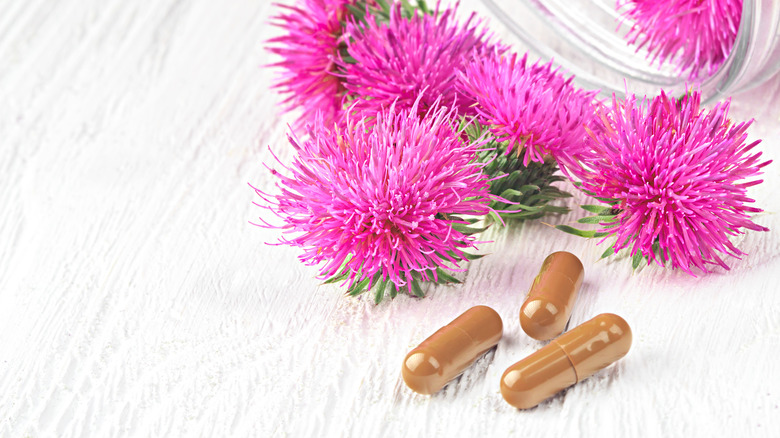Medications That Could Have Negative Interactions With Milk Thistle
The milk thistle plant, also known as Silybum marianum, is a popular herbal remedy (via Mount Sinai). The plant's extract has been used to treat ailments of the liver, kidney, and gallbladder for over 2,000 years. But if you're taking certain medications, adding milk thistle to your daily regimen may not be the best idea.
The active ingredient in milk thistle is a special set of plant mixtures called silymarin (via Healthline). It's believed to have antioxidant, antiviral, and anti-inflammatory properties that are used traditionally for things like increasing breast milk production and protecting the liver from snakebites. Nowadays, it's often known for its results in preserving the liver and is used by people who have liver disease and even liver cancer. However, it can also be used to protect against brain function decline and prevent age-related damage to the brain cells that can lead to Alzheimer's and Parkinson's diseases. Additional benefits include assisting with bone health, reducing the side effects that come with treating cancer, lessening the chance of acne scars, and lowering blood sugar levels in diabetics. Like most remedies, it has minimal side effects, but further research is needed to determine the proper dosage and clinical effects.
Check with your doctor about medications you're taking
Despite its many potential benefits, milk thistle may have interactions with certain pharmaceutical drugs (via Mount Sinai). Since it acts on the liver, which is where drugs are metabolized, it's best to check with your doctor before taking milk thistle with some medications: antipsychotics, Dilantin (used for seizures), Halothane (used during anesthesia), and birth control pills or hormone replacement therapy. Experts also advise against mixing milk thistle and drugs acted on by the same liver enzymes. This would include allergy medication like Allegra, anti-anxiety drugs like Xanax and Ativan, blood thinners like Coumadin, and certain cancer drugs.
Milk thistle isn't consumed the same by every individual. Some take it as a supplement, and others prefer to ingest it as a tea (via Medical News Today). Occasionally, it can cause nausea, upset stomach, heartburn, and a laxative effect. Since it's not approved or regulated by the FDA, it's wise to speak with your doctor before adding an herbal remedy such as milk thistle to your routine.


